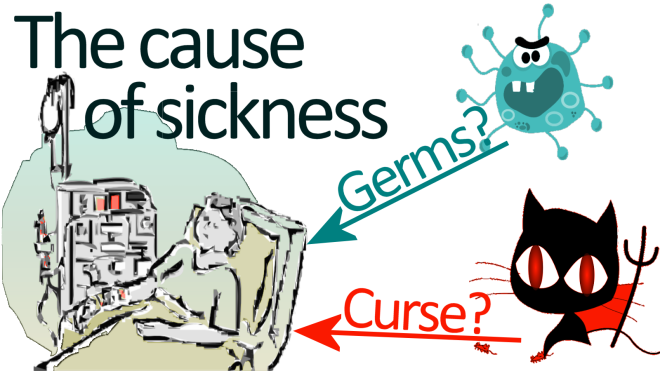 In an article on the BBC New website, an African journalist wrote:
In an article on the BBC New website, an African journalist wrote:
“It is impossible to cultivate a spirit of innovation and transformation when people believe themselves helpless about their plight.” (Source: Is Nigeria being punished by God? by Adaobi Tricia Nwaubani)
In the article, the author tells of a Nigeria state governor who blamed sin for an outbreak of cholera.
“People have turned away from God… that is just the cause of this outbreak as far as I am concerned,”
The author goes on to say that this belief is prevalent in Nigeria, not just among politicians. That matches my experience. Many Africans, certainly not all, blame most problems on supernatural or mystic causes as though unsanitary conditions have nothing to do with outbreaks of disease. Others, like Adaobi, find that approach problematic. Some of them, like some Westerners, think that religion is the problem.

But does reading the Bible cause people put their trust in mystic causes or believe that they are helpless about their plight? Some people mught read the blessings and curses in Deuteronomy 28 and come to the conclusion that there is nothing to do but sit back and trust that God will magically intervene to make them rich (even though the chapter itself contains language that contradicts that conclusion). But is that what usually happens? I don’t think so.
The Protestant work ethic was developed by people who were very serious about the Bible, God’s promises, his punishment of sin, and his blessings for obedience. Mensah Otabil, the founder and leader of the International Central Gospel Church in Accra, is also serious about God’s blessings coming through faith, yet he preaches that God calls us to personal responsibility. According to some, his message has given rise to a new entrepreneurial class in Ghana which has also had no small influence on economic growth and politics. Evaluations of the effects of Bible translation in Ghana find that people to read the Bible in their own languages have greater confidence and they are more likely to take initiative including for their own economic well-being. These results are the opposite of what one would expect if the Bible message caused people to kick back and just rely on God giving them mystic blessings.
 In an article in Christianity Today, the renowned American sociologist, Peter Berger, noted that:
In an article in Christianity Today, the renowned American sociologist, Peter Berger, noted that:
The message that most Pentecostals hear, far from preaching passive acceptance, encourages behavior which requires a lot of effort: hard work, saving, giving up alcohol and sexual promiscuity, and so on. If advocacy of this behavior is linked to a promise of, if not great wealth, at any rate material betterment, this is not a false promise.
Research by secular scholars has found that African churches preaching faith and against the sins of womanizing, alcohol and “worldly pleasures” are more effective at reducing urban poverty in Africa than the aid agencies operating in the same cities.
The Seed Company (a Bible translation organization) has found that those who read translations in their own languages feel empowered to take better actions with regard to their problems.
We translate the Bible because it’s message does the opposite of a mass opiate – it causes people to take eternal responsibility, starting right now.
